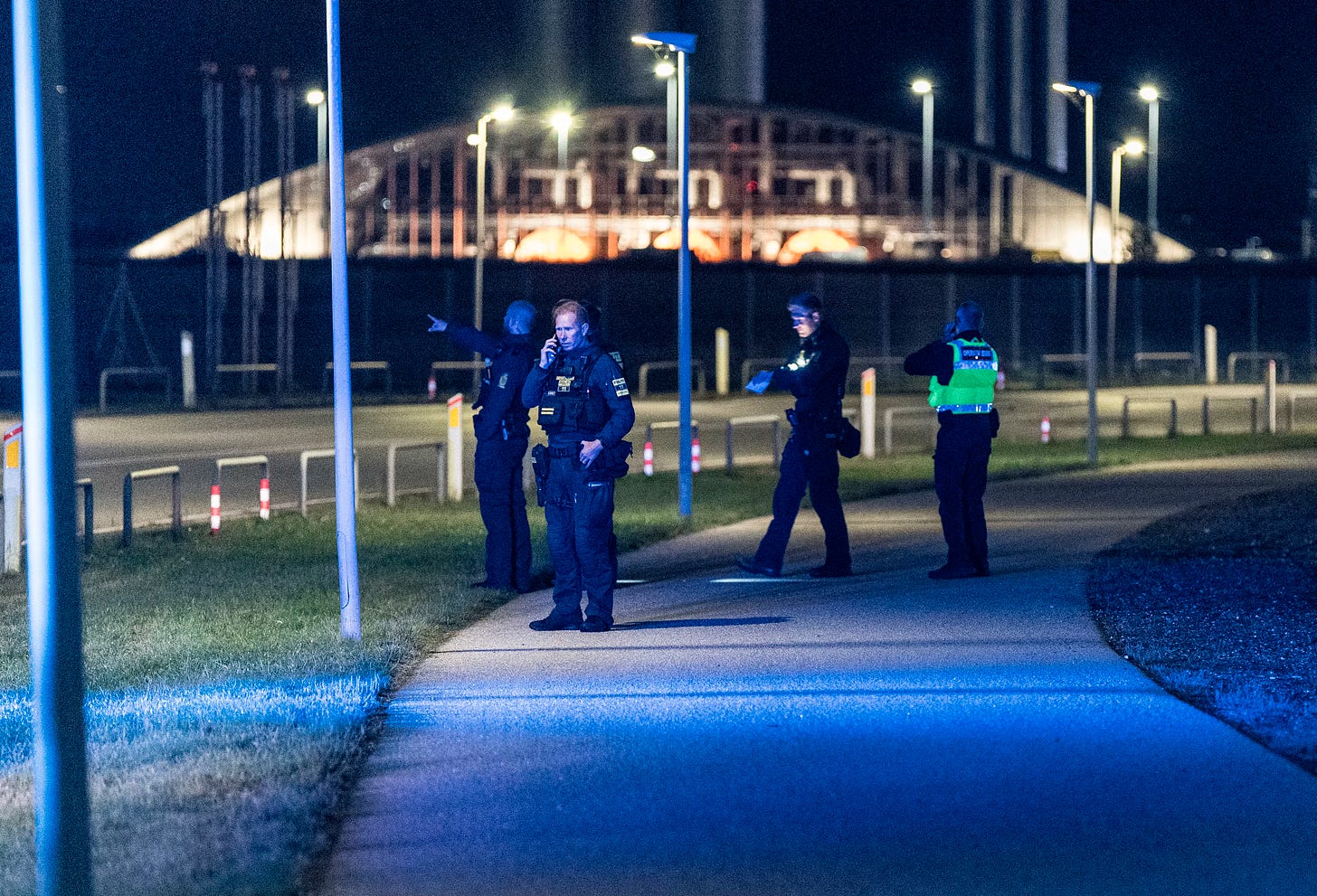🚨 Drones Over Denmark: NATO’s Embarrassing Blind Spot
Cheap, elusive drones keep probing European skies - exposing just how unprepared NATO is for hybrid attacks, and raising the unnerving question: would the U.S. really back Article 5 if tested?

Hot Take Analysis
The sudden appearance of drones over airports and military installations in western Denmark underscores an unsettling reality: NATO’s defenses are not mission-ready for hybrid threats. No casualties or damage were reported, but the optics are devastating. Denmark, a founding NATO member, has now joined Poland and the Netherlands in having its critical infrastructure and civilians exposed to cheap, hard-to-trace aerial incursions.
While no direct evidence links Moscow, Russia remains the prime suspect—and for good reason. Autocrats like Vladimir Putin thrive on probing, pushing, and testing for weakness. Right now, NATO is showing only dotted lines and foggy boundaries, not red ones. That ambiguity invites escalation.
The bigger strategic question is: how far can these probes go before NATO responds in kind—or even contemplates invoking Article 5? And if it ever came to that, would the United States actually engage? Authoritative whispers at UNGA suggest Washington might not, or cannot, commit to join a response to defend Estonia, for instance.
That leaves Europe dangerously exposed. What we’re seeing isn’t just drone incursions—it’s the erosion of deterrence in real time.
A night of drone incidents at airports and military bases all over Jutland, western Denmark, has not caused any harm or damage - and yet it has exposed the country’s defences as vulnerable to attack. In an era of hybrid warfare, there is a sense of embarrassment in Denmark - a founding member of the North Atlantic Treaty Organization (Nato) alliance - that its critical infrastructure has become so vulnerable. Aalborg and Billund airports had to close, while drones were spotted at Esbjerg, Sonderborg and Skrydstrup. Aalborg also serves as a military base and Skrydstrup is home to some of the air force’s F-35 and F-16 war planes. Drones were also seen over the Jutland Dragoon regiment at Holstebro. There have since been reports of police investigating drone activities around Denmark’s oil and gas platforms in the North Sea, and near the central port of Korsor. The question now facing the country’s military is how to respond. None of the drones have been shot down - defence chiefs decided it was safer not to, but that is not a long-term solution. Norway, Estonia, Poland, Bulgaria and Romania have all been subjected to hybrid warfare in recent weeks. All are on Nato’s eastern flank. Estonia and Poland have both invoked Nato’s Article 4 this month after Russian war planes entered Estonian air space for 12 minutes, and about 20 Russian drones violated Polish airspace and were shot down. Denmark has said a “professional actor” was responsible for the drone attacks it saw, and left it at that - BBC
Sergey Lavrov, Russia’s foreign minister, on Thursday suggested his country is at “war” with NATO and the European Union over Ukraine. “NATO and the European Union want to declare, in fact, have already declared a real war on my country and are directly participating in it,” Lavrov said in comments translated by TASS, Russia’s state-owned media agency, at a G20 ministerial conference on the sidelines of the U.N. General Assembly in New York. Lavrov on Wednesday met with Secretary of State Marco Rubio, who urged Moscow to “take meaningful steps toward a durable resolution” to the war and reiterated Trump’s call for an end to the bloodshed, according to a State Department readout - Politico
Moldovan oligarch Vladimir Plahotniuc has been extradited to Chisinau to face long-running criminal charges, jolting the country just days before a tense general election already roiled by allegations of Russian interference. Plahotniuc, who has been implicated with a decade-old bank fraud case known as the “theft of the century,” arrived in the Moldovan capital on September 25 after being extradited from Greece where he had been held since July. Plahotniuc is the lead suspect in a long-running investigation into the disappearance of some $1 billion from banks in the small, impoverished former Soviet republic in 2014. The sum was estimated to amount to around 12 percent of the country’s total gross domestic product. Plahotniuc has fought the charges for years. He was expected to make his first appearance at a Chisinau court on September 26. In a comment to his Facebook page, Plahotniuc’s lawyer, Lucian Rogac, asserted that the arrest took place “in violation of national and international law” and transformed “into a senseless, immoral and illegal televised public trial.” The businessman’s arrival in Moldova came as the country braces for parliamentary elections scheduled for September 28, a vote that will determine if the country moves closer to the European Union or if it falls further into Russia’s political orbit - RFE/RL
The Kremlin is readying the ground to possibly generate possibly violent protests to remove Moldovan President Maia Sandu from power following the parliamentary elections, the Institute for the Study of War says. Recent polling within Moldova suggests that the pro-Western Party of Action and Solidarity (PAS), which currently holds the majority in parliament, may lose its majority in the upcoming elections and that no other parties or blocs will gain a clear majority. Polls indicate that much will hinge on the significant number of still undecided voters and the diaspora vote (whose opinions the polls do not track) such that the probable election results remain unclear at this time.
Russian intelligence officers have reportedly been training Moldovans on how to stage provocations and turn protests violent. The Kremlin may intend to generate violent protests to try to remove Moldovan President Maia Sandu from power.
The Russians may seek to generate a Kremlin-initiated mirror-image of the spontaneous pro-European 2014 Euromaidan protests in Ukraine that drove pro-Russian Ukrainian President Viktor Yanukovych from office.
Now polls suggest President Maia Sandu’s PAS party faces a serious challenge from pro-Russian or nominally pro-European opposition parties that could deny her a parliamentary majority. Without a solid majority, the government may struggle to complete demanding economic and political reforms to join the EU, while it continues to grapple with entrenched poverty, stubbornly high inflation and relatively large numbers of Ukrainian refugees. Earlier this week, Moldovan authorities detained 74 people in 250 raids over an alleged Russia-backed plot to incite riots. Recean accused Russia of spending hundreds of millions of euros in an attempt to take power and lay “siege on our country”. The Kremlin has rejected all accusations of election meddling. - The Guardian
“Since Russia’s full-scale invasion of Ukraine in February 2022, at least 128 media workers have been killed—many of them deliberately targeted by Russian forces. A stark reminder: targeting journalists is a war crime, whether it happens in Ukraine, the occupied Gaza Strip, or Venezuela.”
A court on Thursday sentenced former French president Nicolas Sarkozy to five years in prison over a scheme for late Libyan dictator Moamer Kadhafi to fund his 2007 presidential run. In a verdict that will make the rightwinger the first French postwar leader to serve jail time, the Paris criminal court convicted Sarkozy, 70, on criminal conspiracy charges. However, it acquitted the former head of state, France‘s president from 2007 to 2012, of corruption and personally accepting illegal campaign financing. The court ordered that Sarkozy should be placed in custody at a later date, with prosecutors to inform him on October 13 when he should go to prison. He was also fined €100,000 ($117,000) and banned from holding public office. He has been convicted already in two separate trials but always avoided jail, in one case serving his graft sentence with an electronic tag, which has since been removed. Sarkozy, who was present in court for the verdict accompanied by his model and musician wife Carla Bruni-Sarkozy as well as his three sons, looked ashen-faced and shaken after the verdict. But he vowed to appeal and his lawyer Christophe Ingrain later confirmed one had been filed. The verdict was “extremely serious for the rule of law”, Sarkozy told reporters after leaving the courtroom, adding that he would “sleep in prison with my head held high”. He added: “This injustice is a scandal,” he said. Sarkozy will have to serve his sentence while awaiting the outcome of his appeal. He is to be the first French leader to be incarcerated since Philippe Petain, the Nazi collaborationist head of state of France’s Vichy regime, who was jailed after World War II - France 24
U.S. Defense Secretary Pete Hegseth will meet with top military leaders next week, the Pentagon confirmed Thursday, following a report that the rare gathering will include hundreds of generals and admirals. “The Secretary of War will be addressing his senior military leaders early next week,” chief Pentagon spokesperson Sean Parnell said in a statement to The Hill, offering no additional details. The Washington Post first reported that Hegseth earlier this week ordered hundreds of the U.S. military’s generals and admirals to gather on short notice and without a stated reason. The meeting is expected to take place on Tuesday at a Marine Corps base in Quantico, Va., according to the Post. More than a dozen people familiar with the matter told the outlet that the directive was sent to virtually all of the military’s top commanders worldwide — all senior officers with the rank of brigadier general or above, their Navy equivalent and their top enlisted advisers — more than 800 generals or admirals. It’s not clear how many had been ordered to attend the gathering in person. The unexpected confab has created confusion and alarm, as there has not been a Defense secretary in recent history who has ordered such a large number of the military’s top officers to gather like this, and it comes at a time when the Trump administration has taken an axe to the senior ranks - The Hill
US President Donald Trump has said that he will not allow Israel to annex the occupied West Bank, which will come as a blow to Netanyahu, who has been signalling that his administration would do so. Speaking at the Oval Office, Trump said: “I will not allow Israel to annex the West Bank. I will not allow it. Not going to happen.” After a reporter asked if Trump spoke to Netanyahu, he responded: “Whether I spoke to him or not, I did, but I’m not allowing Israel to annex the West Bank. There has been enough, time to stop now”. The US president’s comments come hours after he reiterated that a Gaza deal was close - Al Jazeera
Microsoft has terminated the Israeli military’s access to technology it used to operate a powerful surveillance system that collected millions of Palestinian civilian phone calls made each day in Gaza and the West Bank, the Guardian can reveal. Microsoft told Israeli officials late last week that Unit 8200, the military’s elite spy agency, had violated the company’s terms of service by storing the vast trove of surveillance data in its Azure cloud platform, sources familiar with the situation said. The decision to cut off Unit 8200’s ability to use some of its technology results directly from an investigation published by the Guardian last month. It revealed how Azure was being used to store and process the trove of Palestinian communications in a mass surveillance programme. In a joint investigation with the Israeli-Palestinian publication +972 Magazine and the Hebrew-language outlet Local Call, the Guardian revealed how Microsoft and Unit 8200 had worked together on a plan to move large volumes of sensitive intelligence material into Azure. The project began after a meeting in 2021 between Microsoft’s chief executive, Satya Nadella, and the unit’s then commander, Yossi Sariel. In response to the investigation, Microsoft ordered an urgent external inquiry to review its relationship with Unit 8200. Its initial findings have now led the company to cancel the unit’s access to some of its cloud storage and AI services - The Guardian
Moscow could be next as Putin’s cities face oil shortages from Ukrainian strikes: Ukrainian attacks on Russian oil refineries are close to causing shortages in major cities like Moscow, warns Michael Bociurkiw on Frontline. Watch here






